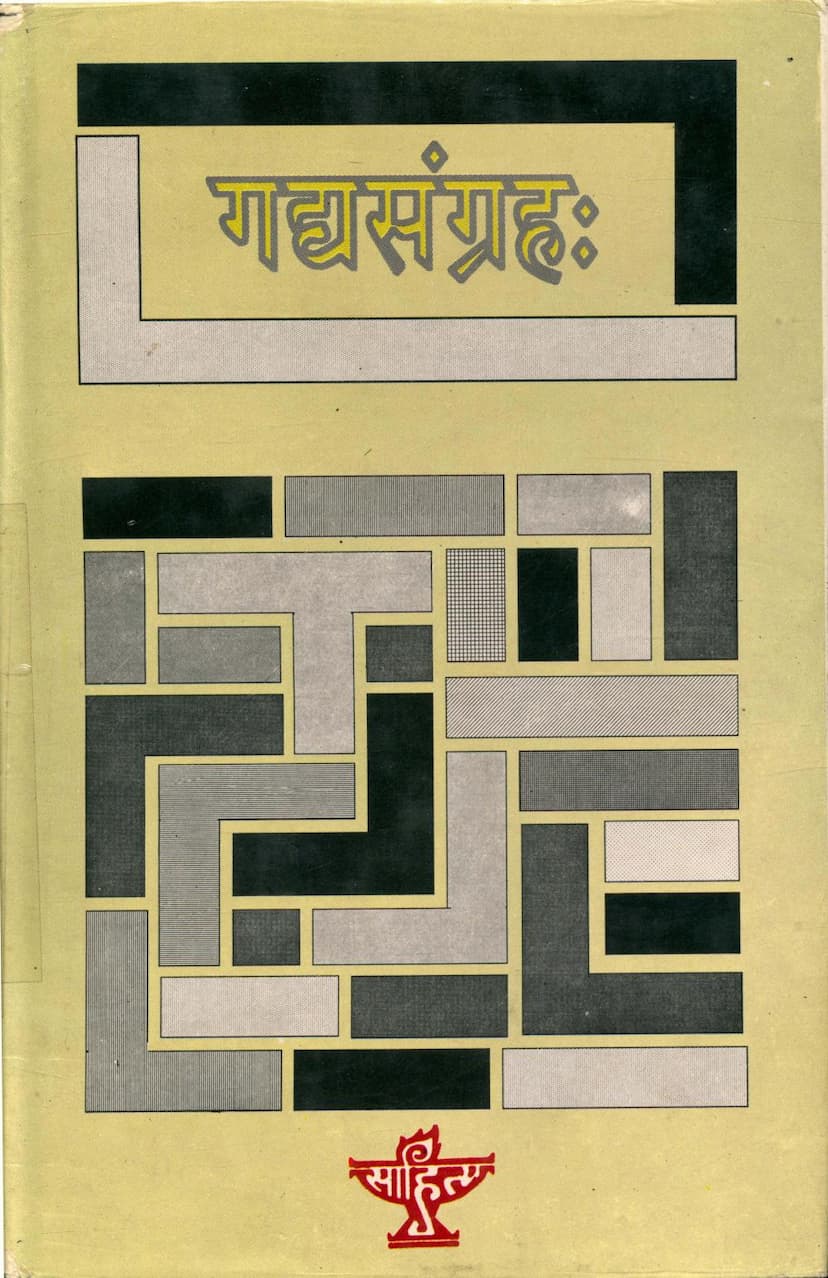Gadyasangraha
Added to library: September 1, 2025

Summary
Here's a comprehensive summary of the Jain text "Gadyasangraha," compiled by Badrinath Shukla and edited by Jayant Mishra, based on the provided text:
Title: Gadyasangraha (Volume IV, Part 1) Compiler: Prof. Badrinath Shukla Editor: Prof. Jayamanta Misra Publisher: Sahitya Akademi, New Delhi (First Published 1996) ISBN: 81-7201-511-9 Price: Rs. 120.00
Overview:
"Gadyasangraha Vol. IV Part 1" is an anthology of prose excerpts from foundational texts of ancient Hindu philosophy, specifically focusing on the Upanishads and the six orthodox (āstika) Darsanas. The compilation aims to provide deep and in-depth knowledge of these classical philosophical works, which embody mystical and esoteric doctrines. The book presents selections from three key Upanishads and the six major Darsanas, offering insights into the core tenets of each school of thought.
Content and Scope:
The anthology includes prose passages from:
-
Upanishads:
- Mundakopanishad
- Taittiriyopanishad
- Chhandogyopanishad
- Brihadaranyakopanishad (mentioned in the table of contents)
-
Darsanas (Philosophical Schools):
- Nyaya
- Vaiseshika
- Samkhya
- Yoga
- Mimamsa (Purva Mimamsa)
- Vedanta (with excerpts from commentaries on Brahma Sutras and Bhagavad Gita by Shankara, Ramanuja, Nimbarka, Madhva, Vallabha, and others, showcasing diverse viewpoints like Advaita, Vishishtadvaita, Dvaita, Dvaitadvaita, etc.)
Beyond the orthodox schools, the collection also includes selections from:
- Jain Philosophy (e.g., Hemachandracharya's Pramana Mimamsa, Haribhadrasuri's Shastra Varta Samuccaya, Syadvada Manjari)
- Buddhist Philosophy (e.g., Tattva Sangraha, Sougata Siddhanta Sara Sangraha)
- Works discussing Materialism (e.g., mentioning Charvaka) and other philosophical perspectives.
The compiler, Prof. Shukla, carefully selected these prose passages based on their subject matter and relevance, irrespective of their chronological order. The objective was to present a comprehensive yet concise collection to avoid an overly lengthy volume.
Purpose and Significance:
The "Gadyasangraha" is intended to serve as a resource for scholars and students seeking a deeper understanding of the philosophical foundations of ancient Indian thought. The compiler and editor express their gratitude to Sahitya Akademi for publishing this anthology, which aims to:
- Address the deep inquiries of humanity regarding the universe, life, and the divine.
- Provide a comprehensive overview of the various schools of Indian philosophy.
- Offer valuable knowledge to those seeking philosophical enlightenment.
Editorial Approach:
The editor, Prof. Misra, highlights that the compilation was undertaken following an invitation from Sahitya Akademi. The selection aimed for prose that is not difficult to read, harsh to the ear, or mentally taxing to contemplate. Each prose selection is intended to be understandable on its own, with the hope that readers will be inspired to delve into the full original texts. The compiler acknowledges that the chronological ordering of the selections might not align with historical views but prioritized thematic relevance according to his own scholarly interest, requesting forgiveness from experts for any discrepancies.
Key Themes and Concepts:
The excerpts cover a wide range of philosophical concepts central to Indian thought, including:
- Epistemology: The nature of knowledge, valid means of knowledge (pramana), and the relationship between words and meaning.
- Metaphysics: The nature of reality, the ultimate cause of the universe, the concept of Brahman, the relationship between the individual soul (Atman/Jiva) and the Absolute (Brahman), the existence and nature of God, and the concept of matter (jada).
- Soteriology: The nature of liberation (moksha/apavarga), the path to liberation (various yogas, devotion, knowledge, action), the causes of bondage (avidya, karma), and the ultimate goal of human life (purushartha).
- Ethics and Psychology: The nature of suffering (duḥkha), its causes and cessation, ethical principles, the mind (manas), and consciousness.
Overall Contribution:
"Gadyasangraha Vol. IV Part 1" is a significant contribution to Sanskrit literature and Indian philosophy. By bringing together key prose passages from diverse philosophical traditions in a structured and accessible manner, it serves as a valuable resource for anyone interested in exploring the intellectual landscape of ancient India. The compiler's scholarly expertise and the editor's careful presentation make this anthology a cornerstone for understanding the foundational texts of Hindu and other Indian philosophical systems.